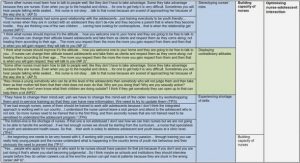Get Complete Project Material File(s) Now! »
Introduction
In this chapter, I shall discuss land in the Deuteronomistic history (DH), in the Law, in Prophetic texts and city laments, bearing in mind, firstly, that the context of instability within which the small states of Israel and Judah struggled to hold possession of their land might have influenced their religious thought and institutions.
Secondly, that biblical texts concerning land and land loss should be understood as a testimony of Israel’s will to survive, to return from the diaspora and to establish itself on the promised land, despite the demise of nations and the shrinkage of various empires in the political arena of the ancient Near East.
Thirdly, my attempt is to incorporate the landless experience into the traditional land theology. I therefore propose a reading of the patriarchal narratives not focusing on the conventional discussion of a promised land or a promise to the fathers. My emphasis falls rather on the rhetoric of landlessness and diaspora so crucial in these narratives and, yet, often overlooked.
The Different Memories of the Land Issue in the Hebrew Bible
As with many other subjects and institutions, land is not a neutral subject. Land issues in the Hebrew Bible are neither theological, nor is it sociologically disinterested, nor a homogeneous, coherent thought (Menezes 1986:26). In the quest for ‘the truth behind the text’ there might have been a ‘hidden agenda’ as Gous has suggested (1992:186). Habel (1995) illustrates the ideological motivations behind the various land ‘theologies’ according to the different interests behind the biblical text. As an example, Keefe (2001:113) explains, ‘there seems to be a struggle between the deity of the landless exiles who had religious memories such as the tribes of peasants liberated from Egyptian slavery by Yahweh, against the deity of elite city dwellers and land holders’. Brueggemann has deepened critical awareness of the ‘trajectories’ that shaped the biblical literature and sociology of the ancient Israel (1979:161-85).
In short, the characteristic of the Mosaic trajectory is the tendency to be a movement of protest by the dispossessed who hold views of a deity who intrudes into the political arena in defense of the dispossessed. In contrast, the Davidic trajectory expresses theological views of Yahweh in royal terms. He consolidates and secures the present order of affairs (the Davidic rule and its institutions) as discussed previously under Zion tradition.
Land in the Deuteronomistic History (DH)
The Deuteronomistic theology differed greatly from the Zion theology; the main contrast is that Yahweh’s salvation and his gift of the land were conditional. In order to survive in a political unstable environ and possess the land, Israel should be faithful to Yahweh’s covenant (Le Roux 1987:129). The Deuteronomistic historians (or editors) intend to provide answers to the collapse of the two kingdoms and to assist the exilic community to survive without losing its identity. In their view, choosing a faithful life in the present exile, keeping the covenant (Tôr??) with Yahweh, Israel might survive and return to the promised land (Weber 1971:4,5).
They emphasized the casual relationship between land possession and tôr?? obedience, between sin and punishment (??ôn / hatt???) and obedience and blessing. The loss of land was the result of kings and people’s failure to comply with the covenant (Le Roux 1987:129,130).
CHAPTER 1 INTRODUCTION 1.1 Background
1.2 Motivatio
1.3 Statement of the problem
1.4 Definition of terms
1.4.1 Land
1.4.2 Being landless
1.5 Objectives
1.7 Chapter Division
CHAPTER 2 LAND LOSS IN THE CONTEXT OF THE ANCIENT NEAR EASTERN WORLD
2.1 Introduction
2.2 Imperial policies of Neo-Assyrians and Neo-Babylonians
2.2.1 The effect on the Northern kingdom of Israel
2.2.2 The effect on the Southern kingdom of Judah
2.2.3 The effect on the ordinary people
2.3 City-laments and landlessness
2.4 Zion traditions
2.4.1 Sacredness and inviolability of Zio
2.5 Summary
CHAPTER 3 THEOLOGY OF LAND IN THE HEBREW BIBLE
3.1 Introductio
3.2 The different memories of the land issue in the Hebrew Bible
3.2.1Land in the Deuteronomistic History (DH)
3.2.2 Land as a gift from Yahweh (năhălāh)
3.3 Land in the Holiness Code
3.4 Land in the prophetic texts
3.5 City-laments
3.6 Landless experience from the Beginnings
3.7 Summary
CHAPTER 4 THE EXPERIENCE OF LAND LOSS IN THE BOOK OF LAMENTATIONS
CHAPTER 5 CONCLUSION
BIBLIOGRAPHY
GET THE COMPLETE PROJECT
THE EXPERIENCE OF LANDLESSNESS IN THE ANCIENT NEAR EAST AS EXPRESSED IN THE BOOK OF LAMENTATIONS




